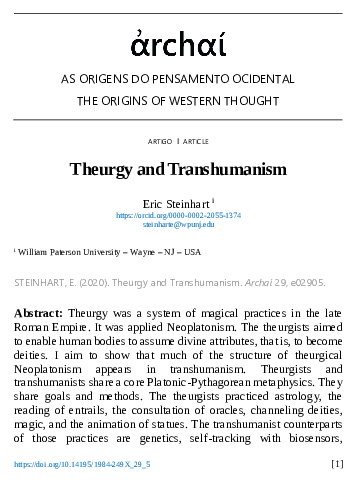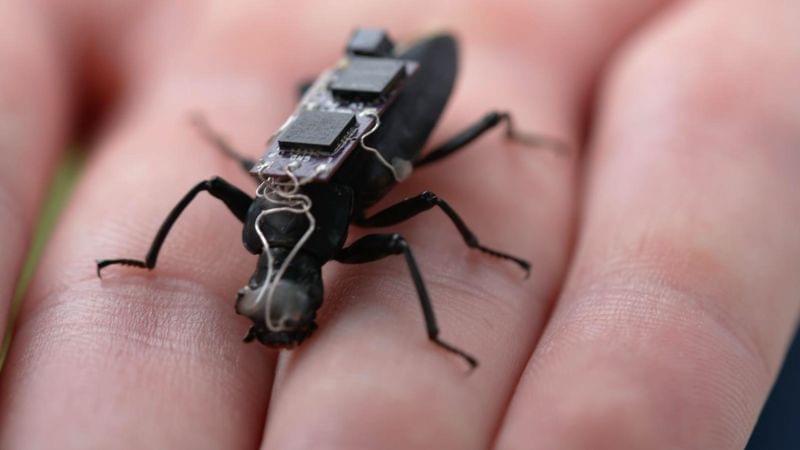Category: transhumanism – Page 7
Posthumanism and Transhumanism in 2024🧠 #Posthumanism #Transhumanism #FutureTech
Exploring posthumanism and transhumanism: the future of human evolution.
Discover the fascinating realms of posthumanism and transhumanism! 🧠✨ How will future technologies redefine humanity? Join us as we explore the ethical implications, potential benefits, and groundbreaking advancements that could lead to a world where humans transcend their biological limitations. Will we embrace a future where mind and machine merge? Find out in this enlightening journey into the future of human evolution! 🌟
#Posthumanism #Transhumanism #FutureTech

Theurgy and Transhumanism
Theurgy was a system of magical practices in the late Roman Empire. It was applied Neoplatonism. The theurgists aimed to enable human bodies to assume divine attributes, that is, to become deities. I aim to show that much of the structure of theurgical Neoplatonism appears in transhumanism. Theurgists and transhumanists share a core Platonic-Pythagorean metaphysics. They share goals and methods. The theurgists practiced astrology, the reading of entrails, the consultation of oracles, channeling deities, magic, and the animation of statues. The transhumanist counterparts of those practices are genetics, self-tracking with biosensors, artificial intellects like Google and Siri, brain-computer interfaces, programming, and robotics. Transhumanist techno-theurgy shows how Neoplatonism can be a modern philosophical way of life.
See full PDFdownloadDownload PDF.

Russian Cosmism | Nikita Petrov & George Young
And Patreon: https://www.patreon.com/nikitapetrov.
00:01:27 What is Russian cosmism?
00:12:51 The religious side of cosmism.
00:17:13 Cosmism as a response to the challenges of the 20th century.
00:25:20 Nature as a temporary enemy and eternal friend.
00:40:21 Pavel Florensky, the Russian da Vinci.
00:46:08 Plant life as a spiritual ideal.
00:51:17 The father of the Soviet space program, and his weird spirituality.
01:03:59 Cosmism and transhumanism: Compare and contrast.
01:09:01 Cosmism as a Russian propaganda project.
Watch this conversation on MeaningofLife.tv http://meaningoflife.tv/videos/36257
Nikita Petrov (MeaningofLife.tv) and George Young (University of New England, The Russian Cosmists)
Recorded on 09/06/2016.

Giant cyborg cockroaches could be the search and rescue workers of the future
Fitzgerald says cyborg search and rescue beetles or cockroaches might be able to help in disaster situations by finding and reporting the location of survivors and delivering lifesaving drugs to them before human rescuers can get there.
But first, the Australian researchers must master the ability to direct the movements of the insects, which could take a while. Fitzgerald says that although the work might seem futuristic now, in a few decades, cyborg insects could be saving lives.
He’s not the only roboticist creating robots from living organisms. Academics at the California Institute of Technology (Caltech), for example, are implanting electronic pacemakers into jellyfish to control their swimming speed. They hope the bionic jellies could help collect data about the ocean far below the surface.
From Homo Sapiens to Holo Syntellectus: A Journey into the Cybernetic Singularity
Step Into the Future with The Cybernetic Singularity: The Syntellect Emergence 🎧 The groundbreaking third volume of The Cybernetic Theory of Mind series by Alex M Vikoulov is now available as an audiobook!
Ecstadelic Media Group releases a new non-fiction audiobook The Cybernetic Singularity: The Syntellect Emergence, in addition to a previously published Kindle eBook, part of The Cybernetic Theory of Mind series. Written by Alex M. Vikoulov; Narrated by Virtual Voice; Foreword by Antonin Tuynman, PhD; Format: Audible audiobook (Press Release, Burlingame, CA, USA, November 16, 2024 09.23 AM PST)
The Cybernetic Singularity: The Syntellect Emergence is a visionary exploration of humanity’s impending transition into a post-biological state of existence, where artificial intelligence, advanced cybernetics, and collective intelligence converge to form a unified Global Mind. As the third installment in The Cybernetic Theory of Mind series, this book delves into the transformative potential of AI and the emergence of hyperconnected “infomorphs” — substrate-independent minds transcending biological limitations. It examines the profound philosophical, technological, and existential implications of this evolutionary leap, which may redefine what it means to be human. The book also introduces key concepts like Cybernetic Immortality and Experiential Realism, suggesting how we might engineer a future of infinite creativity and bliss.
With the Syntellect Hypothesis as its foundation, The Cybernetic Singularity presents a roadmap to the ultimate phase transition of civilization — the awakening of a universal consciousness network capable of synthesizing knowledge, experience, and purpose at unimaginable scales. From the rise of transhumanism to the development of a planetary superorganism, the narrative connects cutting-edge scientific insights with metaphysical musings on the nature of reality. Opening with Norbert Wiener’s quote, “The world of the future will be an even more demanding struggle against the limitations of our intelligence,” the book invites readers to contemplate their role in this grand cosmic drama. Whether you are a technophile, philosopher, or futurist, this volume is an essential guide to understanding and embracing the dawn of the Syntellect Emergence.

Should You Take Experimental Life Extension Drugs?
My output on my personal blog has been low lately. That’s largely because I’m pushing hard to finish a complete draft of my book on biostasis. If I can keep up the pace, I expect to finish a draft around the end of the year or in January 2025. The blog entries I have written have been on our group blog for Biostasis Technologies. Subscribers will probably enjoy my October 29 entry:
I look at the origins of effective accelerationism (e/acc) and its unacknowledged roots in extropian transhumanism as well as in several Singularitarian writers. Noah Smith has noted the “extropian enthusiasm” of e/acc. The original essays by the e/acc founders can be difficult to distill down so I outline the basics of e/acc and then survey the many flavors of accelerationism. I point out errors in e/acc’s contrast with transhumanism. That is followed by a critique of the injunction to “follow the will of the universe.” Despite errors and shortcomings I conclude that e/acc is more right than wrong. From the perspective of the central important of life extension, I outline what might be called long/acc or longevity accelerationism.
Synthetic Biology: George Church on Genome Sequencing and De-Extinction
The great George Church takes us through the revolutionary journey of DNA sequencing from his early groundbreaking work to the latest advancements. He discusses the evolution of sequencing methods, including molecular multiplexing, and their implications for understanding and combating aging.
We talk about the rise of biotech startups, potential future directions in genome sequencing, the role of precise gene therapies, the ongoing integration of nanotechnology and biology, the potential of biological engineering in accelerating evolution, transhumanism, the Human Genome Project, and the importance of intellectual property in biotechnology.
The episode concludes with reflections on future technologies, the importance of academia in fostering innovation, and the need for scalable developments in biotech.
00:00 Introduction to Longevity and DNA Sequencing.
01:43 George Church’s Early Work in Genomic Sequencing.
02:38 Innovations in DNA Sequencing.
03:15 The Evolution of Sequencing Methods.
07:41 Longevity and Aging Reversal.
12:12 Biotech Startups and Commercial Endeavors.
17:38 Future Directions in Genome Sequencing.
28:10 Humanity’s Role and Transhumanism.
37:23 Exploring the Connectome and Neural Networks.
38:29 The Mystery of Life: From Atoms to Living Systems.
39:35 Accelerating Evolution and Biological Engineering.
41:37 Merging Nanotechnology and Biology.
45:00 The Future of Biotech and Young Innovators.
47:16 The Human Genome Project: Successes and Shortcomings.
01:01:10 Intellectual Property in Biotechnology.
01:06:30 Future Technologies and Final Thoughts.
What If We Became A Type 3 Civilization? 15 Predictions
This video explores what life would be like if we became a Type 3 Civilization. Watch this next video about us becoming a Type 2 civilization: • What If We Became A Type 2 Civilizati…
🎁 5 Free ChatGPT Prompts To Become a Superhuman: https://www.futurebusinesstech.com/su…
🤖 AI for Business Leaders (Udacity Program): https://bit.ly/3Qjxkmu.
☕ My Patreon: / futurebusinesstech.
➡️ Official Discord Server: / discord.
SOURCES:
• https://www.futuretimeline.net.
• The Singularity Is Near: When Humans Transcend Biology (Ray Kurzweil): https://amzn.to/3ftOhXI
• The Future of Humanity (Michio Kaku): https://amzn.to/3Gz8ffA
💡 Future Business Tech explores the future of technology and the world.
Examples of topics I cover include:
• Artificial Intelligence \& Robotics.
• Virtual and Augmented Reality.
• Brain-Computer Interfaces.
• Transhumanism.
• Genetic Engineering.
SUBSCRIBE: https://bit.ly/3geLDGO
Disclaimer: